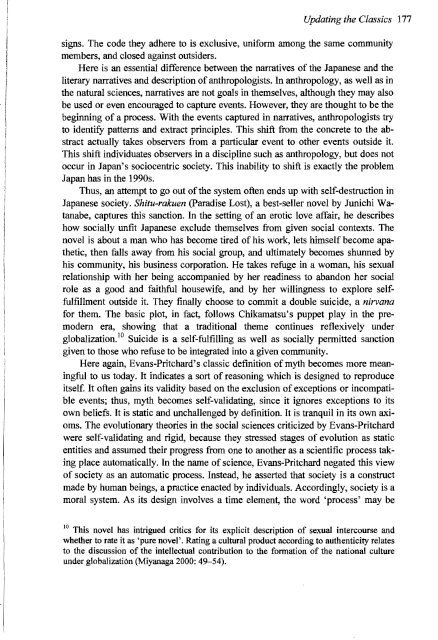JASO - Institute of Social and Cultural Anthropology - University of ...
JASO - Institute of Social and Cultural Anthropology - University of ...
JASO - Institute of Social and Cultural Anthropology - University of ...
Create successful ePaper yourself
Turn your PDF publications into a flip-book with our unique Google optimized e-Paper software.
Updating the Classics 177<br />
signs. The code they adhere to is exclusive, unifonn among the same community<br />
members, <strong>and</strong> closed against outsiders.<br />
Here is an essential difference between the narratives <strong>of</strong> the Japanese <strong>and</strong> the<br />
literary narratives <strong>and</strong> description <strong>of</strong> anthropologists. In anthropology, as well as in<br />
the natural sciences, narratives are not goals in themselves, although they may also<br />
be used or even encouraged to capture events. However, they are thought to be the<br />
beginning <strong>of</strong> a process. With the events captured in narratives, anthropologists try<br />
to identify patterns <strong>and</strong> extract principles. This shift from the concrete to the abstract<br />
actually takes observers from a particular event to other events outside it.<br />
This shift individuates observers in a discipline such as anthropology, but does not<br />
occur in Japan's sociocentric society. This inability to shift is exactly the problem<br />
Japan has in the 1990s.<br />
Thus, an attempt to go out <strong>of</strong> the system <strong>of</strong>ten ends up with self-destruction in<br />
Japanese society. Shitu-rakuen (paradise Lost), a best-seller novel by Junichi Watanabe,<br />
captures this sanction. In the setting <strong>of</strong> an erotic love affair, he describes<br />
how socially unfit Japanese exclude themselves from given social contexts. The<br />
novel is about a man who has become tired <strong>of</strong> his work, lets himself become apathetic,<br />
then falls away from his social group, <strong>and</strong> ultimately becomes shunned by<br />
his community, his business corporation. He takes refuge in a woman, his sexual<br />
relationship with her being accompanied by her readiness to ab<strong>and</strong>on her social<br />
role as a good <strong>and</strong> faithful housewife, <strong>and</strong> by her willingness to explore selffulfillment<br />
outside it. They finally choose to commit a double suicide, a nirvana<br />
for them. The basic plot, in fact, follows Chikamatsu's puppet play in the premodem<br />
era, showing that a traditional theme continues reflexively under<br />
globalization. lo Suicide is a self-fulfilling as well as socially pennitted sanction<br />
given to those who refuse to be integrated into a given community.<br />
Here again, Evans-Pritchard's classic definition <strong>of</strong> myth becomes more meaningful<br />
to us today. It indicates a sort <strong>of</strong> reasoning which is designed to reproduce<br />
itself. It <strong>of</strong>ten gains its validity based on the exclusion <strong>of</strong> exceptions or incompatible<br />
events; thus, myth becomes self-validating, since it ignores exceptions to its<br />
own beliefs. It is static <strong>and</strong> unchallenged by definition. It is tranquil in its own axioms.<br />
The evolutionary theories in the social sciences criticized by Evans-Pritchard<br />
were self-validating <strong>and</strong> rigid, because they stressed stages <strong>of</strong> evolution as static<br />
entities <strong>and</strong> assumed their progress from one to another as a scientific process taking<br />
place automatically. In the name <strong>of</strong> science, Evans-Pritchard negated this view<br />
<strong>of</strong> society as an automatic process. Instead, he asserted that society is a construct<br />
made by human beings, a practice enacted by individuals. Accordingly, society is a<br />
moral system. As its design involves a time element, the word 'process' may be<br />
10 This novel has intrigued critics for its explicit description <strong>of</strong> sexual intercourse <strong>and</strong><br />
whether to rate it as 'pure novel' . Rating a cultural product according to authenticity relates<br />
to the discussion <strong>of</strong> the intellectual contribution to the formation <strong>of</strong> the national culture<br />
under globalization (Miyanaga 2000: 49-54).

















